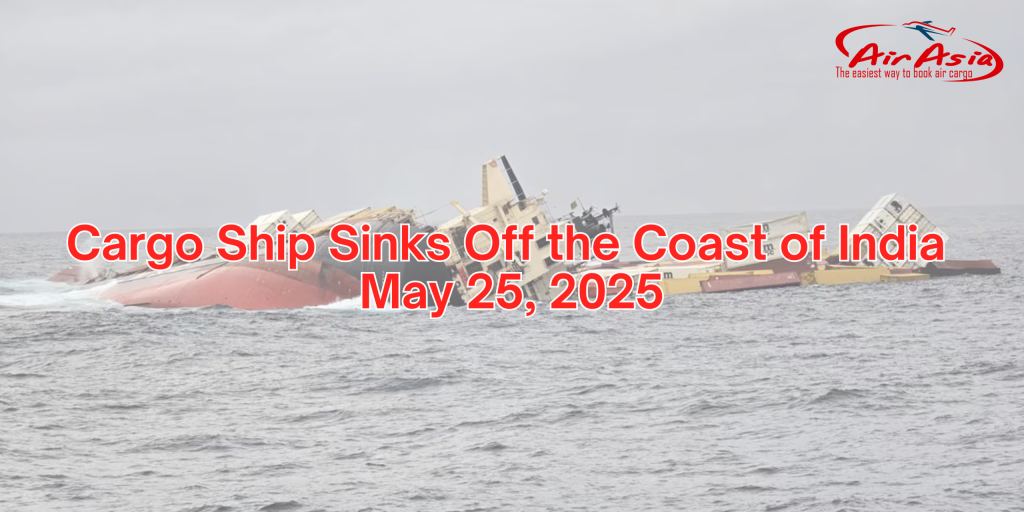Cargo Ship Sinks Off the Coast of India, Fear of Toxic Chemical Spill into the Sea
The cargo ship MSC ELSA 3 flying the Liberian flag capsized and sank on the morning of May 25, 2025, at a location 38 nautical miles off the coast of the port city of Kochi, India. The incident has raised serious concerns about the risk of oil and toxic chemical spills into the sea.
Information on the Cargo Ship Sinking Off the Coast of India
Time: Morning of May 25, 2025.
Location: 38 nautical miles off the coast of the port city of Kochi, Kerala, India.
Ship: MSC ELSA 3 flying the Liberian flag, a large cargo ship that transports goods from various Asian countries to India.
Cargo on Board:
- 84.44 tons of diesel fuel.
- 367.1 tons of furnace oil.
- 640 containers, including:
- 13 containers of hazardous materials.
- 12 containers of calcium carbide (CaC₂).
Local Government’s Rescue Efforts in the Cargo Ship Sinking Off the Coast of India
Discovery of the Incident: Around 5:00 AM, the crew of the MSC ELSA 3 noticed the ship beginning to capsize. The situation quickly became critical, and the captain ordered all crew members to abandon the ship.
Rescue Operations: Indian rescue forces promptly arrived at the scene. They deployed rescue ships and helicopters to search for and rescue the crew. By 8:00 AM, all 24 crew members on board had been safely rescued and brought to shore.
Characteristics of Calcium Carbide
Calcium Carbide (CaC₂):
- Description: Calcium carbide is a colorless solid, primarily used to produce acetylene (C₂H₂), an important raw material in the chemical industry.
- Reaction with Water: When it comes into contact with water, calcium carbide undergoes a highly exothermic reaction, producing acetylene gas and calcium hydroxide (Ca(OH)₂).
- Chemical Reaction: CaC2+2H2O→C2H2+Ca(OH)2
- Consequences:
- Acetylene Gas: Acetylene gas is highly flammable, posing a significant risk of fire and explosion if not properly controlled.
- Calcium Hydroxide: Calcium hydroxide increases the pH of water, which can disrupt the pH balance and have negative impacts on the health and reproduction of marine ecosystems.
- Water Pollution: Acetylene gas and calcium hydroxide pose a serious threat to water quality, particularly to sources of drinking water and water used for agriculture.
How Indian Authorities Are Responding to the Issue
Deployment of Response Vessels: The Indian Coast Guard (ICG) has dispatched the pollution response vessel “Saksham” to the scene.
- Advanced Technology: Aircraft equipped with advanced oil spill mapping technology have been used to monitor the area.
- Monitoring the Situation: As of now, no oil spills have been reported. However, the situation is being closely monitored, and authorities remain on high alert and ready to respond.
Salvage Operations:
- Weather Conditions: Salvage operations are ongoing under adverse weather conditions, which are making the task challenging for the authorities.
- Drifting Containers: Authorities have detected some containers drifting away from the shipwreck and expect them to reach the shore within a few days.
Warning to the Public on the Dangers of the Cargo Ship Sinking Off the Coast of India
Kerala State Disaster Management Authority (KSDMA):
- Urgent Warning: KSDMA has issued an urgent warning to the public, advising them not to touch or approach any containers or objects that may drift ashore.
- Reason: This is to ensure the safety of the community and to avoid potential risks from hazardous chemicals and materials.
Environmental Concerns
Environment:
- Water Pollution: If calcium carbide and other chemicals spill into the sea, it will cause severe pollution, affecting marine ecosystems and drinking water sources.
- Ecosystem Balance: Changes in pH due to calcium hydroxide can disrupt the ecosystem balance, impacting biodiversity.
Economic Impact:
- Fishing Industry: The local fishing industry could be severely affected by water pollution.
- Tourism: Marine tourism activities may be disrupted, causing economic losses for coastal areas.
Conclusion
The sinking of the MSC ELSA 3 has created an emergency situation, but thanks to the swift response of the rescue forces, all crew members were saved. Authorities are continuing to monitor and respond to the risk of oil and chemical spills, while also warning the public about potential hazards. This incident also serves as a reminder of the importance of safety measures in the shipping industry to prevent similar incidents in the future.
If you have additional information or need assistance, please contact us.







